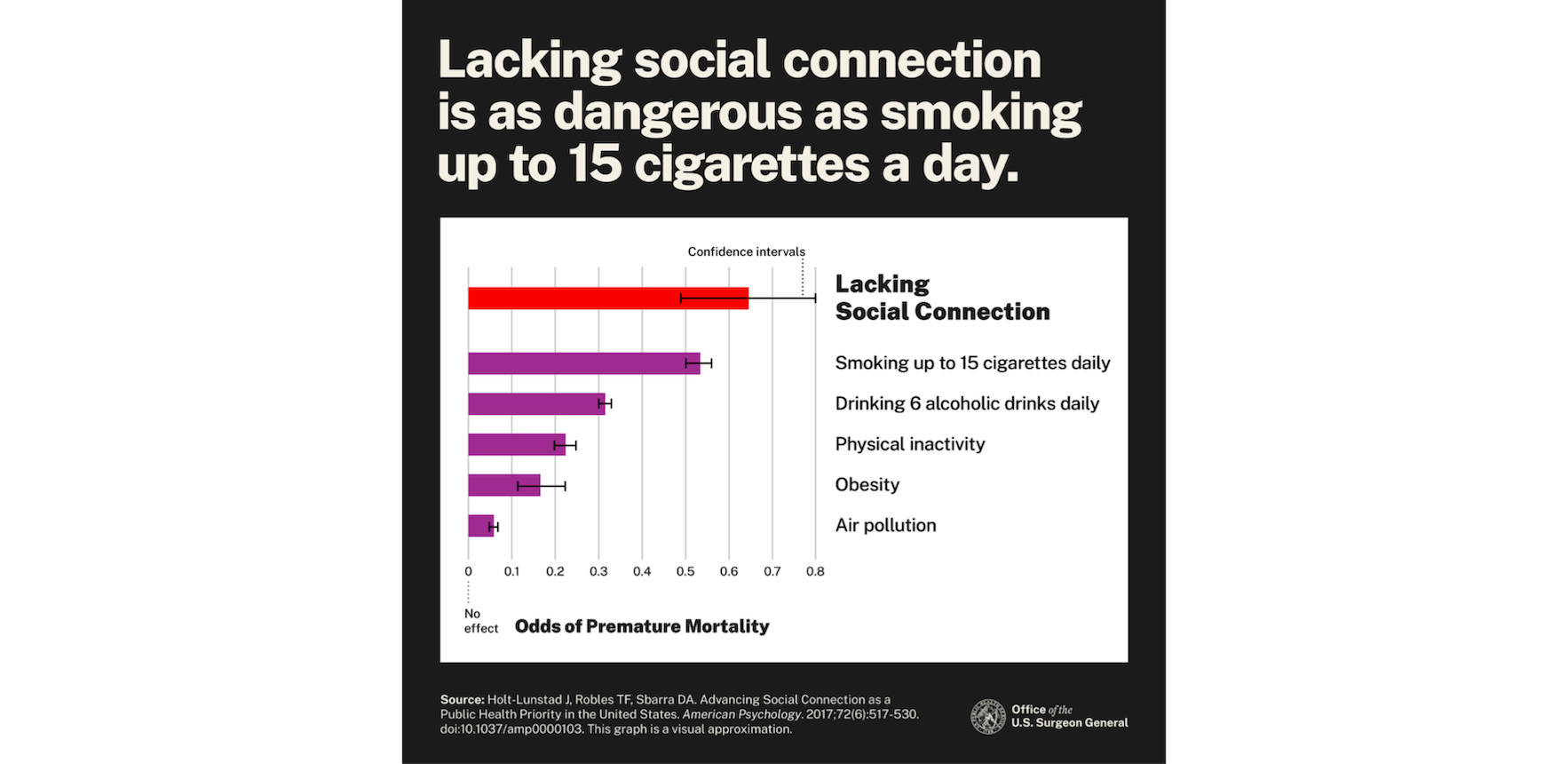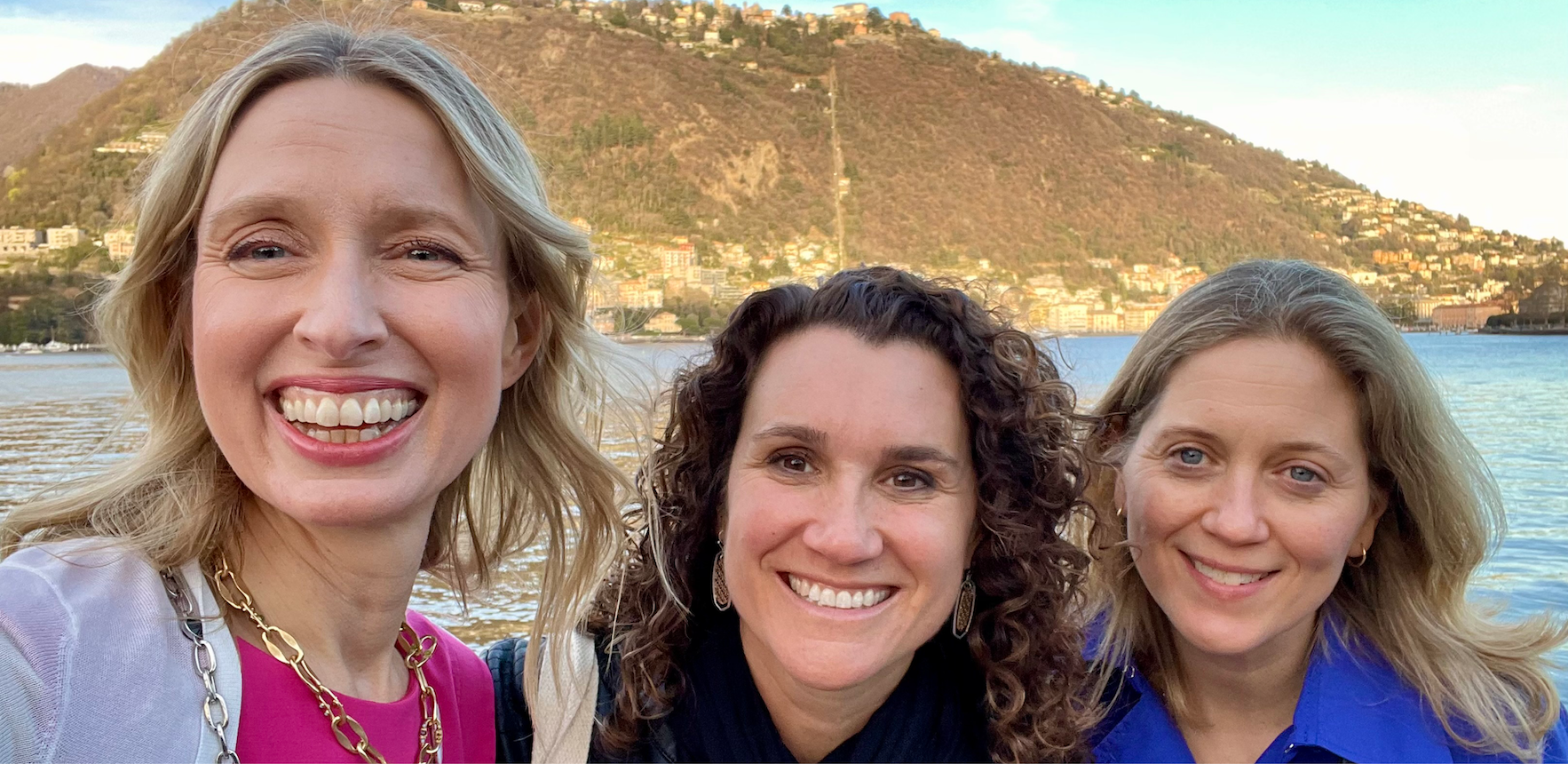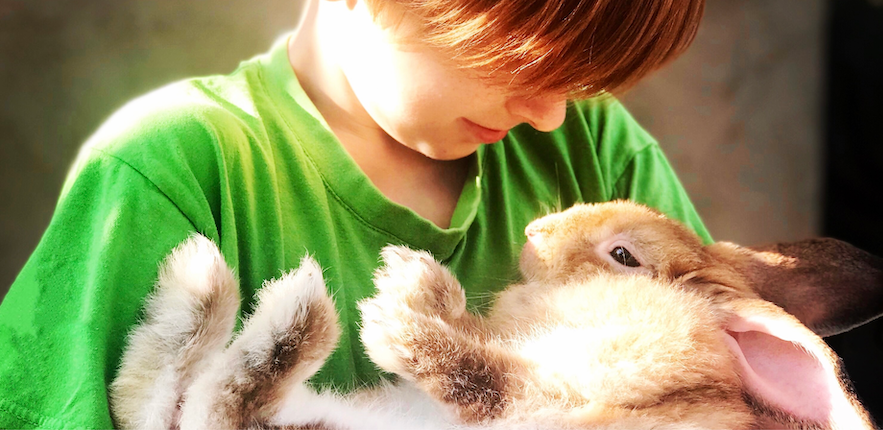12.06.2023 | 8 min read
One simple way to solve loneliness: how we heal a hidden global epidemic
In the first of the World Wellbeing Movement’s guest blog series, Dr Kelli Harding MD discusses how kindness can help to tackle the “hidden global epidemic” of loneliness.Kelli Harding, Marisa Plowden, and Lindsay Barnett
Loneliness is a public health crisis, but how it looks differs greatly from other global epidemics. There are no make-shift hospital tents to accommodate the affected. No ambulances waiting on the ready. No one wearing hazmat suits.
Instead, it’s Mark, who’s at home at 2pm on a Tuesday in his pyjamas. He loves the flexibility of remote work but misses chatting with co-workers between meetings. Or Lily, who sleeps with the TV on because, after raising five grown children, she longs for constant chatter in her now silent home. Or Maxim, who’s surrounded daily by kids at his new school. Before he and his parents relocated because of conflict in their home country, he loved to crack jokes and makes others smile. Now he struggles to express himself in a new language and make a true friend.
You, too, likely have experienced loneliness (the subjective distressing sense of being disconnected from others) or isolation (objective limited social interaction). It’s a common human experience. In May 2023, the US Surgeon General Dr. Vivek Murthy’s report on ‘Our Epidemic of Loneliness and Isolation’ shows that half of adults experience measurable levels of loneliness in the US.1 This loneliness trend pre-dates the pandemic, with the rate increasing among young adults yearly since 1979. And it’s not just the US. A 2022 analysis published in the BMJ of 113 countries from 2000 to 2019 found loneliness a widespread problem globally.2

Source: Holt-Lunstad J, Robles TF, Sbarra DA. Advancing Social Connection as a Public Health Priority in the United States. American Psychology. 2017;72(6):517-530. doi:10.1037/amp0000103. This graph is a visual approximation.
This growing lack of connection has enormous implications for our individual and collective health and wellbeing.3 4 Loneliness is more dangerous than known risk factors to health, such as smoking 15 cigarettes a day, drinking six alcoholic drinks daily, physical inactivity, or obesity. It intensifies the most minor of aches and pains and if left unaddressed, increases the risks of heart disease, stroke, dementia, diabetes, depression, and premature death.5 6
While loneliness may feel dismal, here is the exciting part – the reverse is also true!
Kind, supportive relationships lower stress, the risk of chronic diseases, promote better immune functioning, better lifestyle choices, sleep, and mental health – increasing the odds of survival by 50%.5 Positive social contact is a basic human need, like food, water, rest, and shelter.7 As I describe in my first book, The Rabbit Effect, decades of public health data demonstrate social connection is the most crucial determinant of our physical and mental wellbeing.8 Medical care, while critical, only accounts for about 10 to 20% of our overall health status.9 Much of our good health then depends on creating supportive relationships in our homes, neighbourhoods, schools, workplaces, and communities.
And strengthening our connections with kindness is something we can all do something about.
Your kind or unkind choices in everyday moments make a difference in the health of others. Studies show supportive relationships help us feel more relaxed, learn better, be more creative, solve problems, and be more productive, inclusive workers. 7 10 11 A sense of connection also allows us to trust others, feel a sense of belonging, and engage more actively in civic society.12 13 14 In other words, we all have a vested interest in reducing loneliness among ourselves and others.15
So, what can we do to make the world a kinder and more connected place for everyone?

Kelli (left) with lifelong friends Lindsay Barnett (centre) and Melisa Plowden (right) at the World Happiness Summit 2023.
This was the question that I discussed with two lifelong friends, Marisa Plowden, and Lindsay Barnett, in a taxi at the end of the 2023 World Happiness Summit. We wanted to take action and put into practice the transformative ideas we’d learned at the Summit.
We’re from different professional worlds.
I saw loneliness, kindness, and social connection from a medical and public health perspective. Marisa comes from the world of international diplomacy and public policy. She’s seen first-hand how individual kindness helps people from different countries tackle complex challenges together, transcends borders, and helps us see our shared humanity. Lindsay comes from the business and leadership development world and has seen how kindness can transform workplaces and the loneliness felt when kindness is missing at work.
In each of our fields and more broadly, we saw a profound need to strengthen our social fabric, increase belonging, and empower individuals to make positive social change. We understood the need to create a global network open to anyone willing to commit to making the world a kinder, better place in our everyday lives.
We decided to create ‘Our Kind of Club’.
You have something positive to contribute and can take small kind actions in your daily life in a way that feels comfortable for you. All it takes to join is the intention to create more kindness and positive social connection. Tiny actions collectively bring big social change. Our Kind of Club will help us refocus on the best of our shared humanity.
We embark on this shared adventure around World Friendship Day, July 30, 2023.
A key feature of this club will be a forum to share inspiring and simple examples of kindness to get you thinking about what you’d like to do in your circle of influence. Here are two stories from us to get you started:
Walking down my street, I saw an older woman walking toward me, holding a little girl’s hand. The woman reminded me of my Grandma, who passed away a few years ago. It was something about the style of her hair and bright jewelry. It made me smile to see her, and when she looked at me, she gave me a huge beaming smile right back. At that moment, I felt like my Grandma was smiling at me and felt overwhelmed with happiness. Later that day, it made me think that there is yet another reason to make eye contact and smile at strangers – we may unknowingly represent something or someone dear to them. Without knowing it, that woman I saw that day gave me the great gift of bringing back my Grandmother’s love.
Unfortunately, one of my former mentors died too young from early-onset Alzheimer’s. I still miss him; his kind heart inspired many who felt his care. There was a period at work when I was having a tough time and felt very alone, unsure of what I wanted. Walking into his office, his opening line to me was, “Hi! So, are you having fun?” I burst into tears. He kindly offered me a tissue and said that the most important thing is for work to be fun. Then he asked how we could help me make work fun again. He partnered with me to turn things around, and most importantly, he genuinely cared about my happiness and feelings beyond the work to be done. I pass on his kindness to my staff now.
If you, like us, want to see an end to loneliness and a kinder world, sign up for Our Kind of Club updates at kellihardingmd.com. We’d love to have you join us!
References and further reading
- Our Epidemic of Loneliness and Isolation: The U.S. Surgeon General’s Advisory on the Healing Effects of Social Connection and Community, May 2023
- Surkalim, Daniel L., Mengyun Luo, Robert Eres, Klaus Gebel, Joseph van Buskirk, Adrian Bauman, and Ding Ding. “The prevalence of loneliness across 113 countries: systematic review and meta-analysis.” BMJ 376 (2022).
- Holt-Lunstad, Julianne, and Carla Perissinotto. “Social Isolation and Loneliness as Medical Issues.” New England Journal of Medicine (2023).
- Murthy VH. Surgeon General: We have become a lonely nation. It’s time to fix that. New York Times. April. 2023. https://www.nytimes.com/2023/04/30/opinion/loneliness-epidemic-america.html
- Holt-Lunstad, Julianne, Timothy B. Smith, and J. Bradley Layton. “Social relationships and mortality risk: a meta-analytic review.” PLoS medicine 7, no. 7 (2010): e1000316.
- Pantell M, Rehkopf D, Jutte D, Syme SL, Balmes J, Adler N. Social isolation: a predictor of mortality comparable to traditional clinical risk factors. Am J Public Health. 2013;103(11):2056-2062.
- Tomova, Livia, Kimberly L. Wang, Todd Thompson, Gillian A. Matthews, Atsushi Takahashi, Kay M. Tye, and Rebecca Saxe. “Acute social isolation evokes midbrain craving responses similar to hunger.” Nature Neuroscience 23, no. 12 (2020): 1597-1605.
- Harding, Kelli. The Rabbit Effect: Live longer, happier, and healthier with the groundbreaking science of kindness. Simon and Schuster, Aug 2019. Paperback Nov 2020.
- J. Michael McGinnis et al., “The Case for More Active Policy Attention to Health Promotion,” Health Affairs 21, no. 2 (2002): 78–93; Steven A. Schroeder, “We Can Do Better—Improving the Health of the American People,” New England Journal of Medicine 357, no. 12 (2007): 1221–28.
- Wendy Suzuki, “Fear Shrinks Your Brain and Makes You Less Creative,” interview by Carolyn Centeno Milton, Forbes (April 18, 2018), https://www.forbes.com/sites /carolyncenteno/2018/04/18/fear-shrinks-your-brain-and-makes-you-less-creative /#4b1ab1ef1c6d.
- Kalev, A. and Dobbin, R., 2022. The surprising benefits of work/life support. Harvard Business Review Magazine. https://hbr.org/2022/09/the-surprising-benefits-of-work-life-support
- Richard Layard, Happiness: Lessons from a New Science (UK: Penguin, 2011).
- 2023 Edelman Trust Barometer https://www.edelman.com/trust/2023/trust-barometer
- Hill, Faith. America Is in Its Insecure Attachment Era. The Atlantic. April 27, 2023. https://www.theatlantic.com/family/archive/2023/04/insecure-attachment-style-intimacy-decline-isolation/673867/
- World Happiness Report 2023. https://happiness-report.s3.amazonaws.com/2023/WHR+23.pdf
Header image: With thanks to Kelli Harding
